Erasmus+KA2 Estonia / Finland / Greece / Portugal

Tuesday, 29 October 2019
I. Portuguese articles written for "Democracy and Environment in Institutions”
ERASMUS+ KA2 PROJECT
SCHOOL EDUCATION No. 2018-1-PT01-KA229-047365
Sustainability for Democracy,
Democracy for Sustainability
ESJS-Mafra students interact with journalist Soraia Ramos’s life experiences
Reporter for 14 years, was invited to
talk with students from Escola Secundária José Saramago - Mafra (ESJS - Mafra), on November 12th, about Human Rights violation events she witnessed,
along with other experiences in several countries.
This lecture, which is related to the
Erasmus+ Partnership Project with European Schools - “Sustainability for Democracy, Democracy
for Sustainability”, ended up turning into a conversation, in which everyone “travelled” around the world, through the description of the
reporter’s experiences. It was very interesting and enriching, since Soraia herself gave contemporary examples
of non-compliance with the Universal Declaration of Human Rights, even 69 years after its agreement
(10/12/1948).
Jorge Rocha, current Philosophy teacher
at ESJS-Mafra and Soraia Ramos’s friend, contributed to the presentation, mentioning the journalist’s work in Bangladesh. Soraia
photographed a group of displaced people, without any proper life conditions, surrounding a muddy water
pond - an indecent violation of various articles from the UDHR. With this example, we may conclude
that goods considered essential in the Western World, such as personal hygiene items, are seen as
almost superfluous in unstable populations.
Soraia Ramos also lived within war
scenarios on Eastern Ukraine, Europe. She was surrounded not only by fully armed men, but also by lost people involved in the war that were
there to help her in spite of all the dangers they had to face. She claimed it was the most shocking work
trip she performed. According to Figure 1, this case made Soraia the first female reporter and Portuguese reporter, as well, to execute war coverage.
Next, Soraia Ramos “took” the students
with her to Syria. She narrated the civic obligation of wearing a burka, of which she had to comply as a woman. The same happened in Morocco, where she always carried a scarf to prevent any prosecution. Soraia added that, while being in another country, regardless of the time they’re spending there, everyone should act respectfully towards its laws and civic duties and responsibilities, if we don’t want to take risks. In Syria, no one has the permission to talk directly with women and they are forbidden to express themselves in public: an affront to Article 19 of the UDHR.
By suggestion of a Venezuelan student, the journalist “transported” the
audience to her experiencein the Caracas airport. The security
guards distrusted Soraia Ramos, only for the fact that she carried a single medium-sized backpack with everything she would need along a
transatlantic journey.
Fig.1
PowerPoint slide illustrating Soraia Ramos’ mission in the Eastern Ukraine War.
Thereafter, she was forced to give her backpack to a
full inspection. In addition to this impasse, the journalist also remembers seeing many people running to the supermarkets, early in the morning,
in order to be the first to buy as many goods as they could, to sell them at a higher price. In
Venezuela it’s already considered a job (being a bachaquero), since
that’s the only revenue those people have. Venezuela was experiencing a serious humanitarian crisis, and the Portuguese community there was
significant.
Within Latin America, we followed with Paraguay. The reporter landed at the
airport, with all the official documents needed to identify a European and Portuguese citizen, but
the security guards didn’t trust her identity. This is because, in Paraguay, there is a well-known
business of falsifying documents, as stated by the journalist.
Finally, Brazil, which is an example of the greatest asymmetries and social
inequalities, as well as disrespect for Human Rights - which may be aggravated with the victory of Jair
Bolsonaro for president.
In conclusion, the students and teachers who attended this lecture retained
great benefits from this initiative and are genuinely grateful to the journalist Soraia Ramos for
her great availability.
Marta
Mendes Afonso
Student nr. 18 of class 11SE3, ESJS-Mafra
________________________________________________________________
On December 5th, 2018 a speech on the
role of the military institutions was given by Colonel Nuno Lemos Pires in the auditorium of Escola Secundária José Saramago, in
Mafra.
I will write a critical analysis on this
speech, but before I would like to make a brief summary of some of the aspects covered.
The institutions mentioned in this speech
were the military institutions, which in democratic countries have the role of assuring not only the respect of every individual’s
rights, but also of guaranteeing inclusion and administering violence. However, in unstructured
countries they sometimes wind up being the cause of oppression and may lead to armed
conflicts. War might be considered a permanent situation, which has been a fact throughout History.
There have always been wars, for various reasons, except during a short period of time.
When wars first appeared, they strove for the acquisition of profit. However, across History
they have suffered a huge evolution, more pronounced during the Roman Empire and Napoleonic Wars,
having acquired new purposes and pretexts. One of these pretexts dwells on the
misinterpretation (due to the lack of contextualization of a particular passage) of Scriptures,
such as the Bible, the Torah and the Koran, leading to the so called “just wars”.
Following the exposition of the facts
mentioned above, war was broken down to three factors: natural phenomenon (biological aggressiveness/instincts of violence), social
phenomenon (due to flawed systems) and rational actions (based on different ideologies).
Therefore, as war is a permanent situation, which is deeply ingrained in us as living beings, how can
it be halted? This question was enlightened by the Colonel. War, along with other similar
conflicts, is countered by the respect of the universal values stated in the Universal Declaration of
the Human Rights, by the acceptance of imperfection and the use of reason.At last, a summary was made on the current situation and the future trends. In today’s society, a new type of conflict emerges, the “new wars”, which are fights of ideals, won by fear and of illegal financing. In the future there tends to be an increase in population, a decrease of resources, climate changes, decay of power and development of new technologies.Over the course of this speech, Colonel Nuno Lemos Pires exhibited the fundamental characteristics of a powerful speaker, since he was able to project his voice, in order to reach the whole auditorium, without resorting to the use of a microphone, grasping the attention of the audience and keeping it until the very last minute. I find that the information explained was of extreme relevance, and, due to the content and the shocking images, which portray not only our present but also our future, it was possible for each of the attendants to capture the message transmitted.Finally, I believe that the message spread should be shared with as many people as possible, because it is mandatory to raise awareness to the consequences that some current situations will have in a near future.
Margarida Santos, student nr. 18 of class
11CT6
Marta Cabeça, student nr. 19 of class 11LH5
_________________________________________________________________________________
Τόπος:
2640 Mafra, Portugal
Monday, 5 August 2019
Dissemination Report of the 5th General Lyceum of Veria for the school year 2018 – 2019
ERASMUS+ KA2 PROJECT
SCHOOL EDUCATION No. 2018-1-PT01-KA229-047365
Sustainability for Democracy, Democracy for Sustainability
A school open to society
Dissemination Report of the ERASMUS+ KA2 program “Sustainability and Democracy, Democracy and Sustainability” of the 5th General Lyceum of Veria for the school year 2018 – 2019
On Wednesday 15/5/2019 members of the teaching team and the student group of the Erasmus + KA2 PROJECT-SCHOOL EDUCATION No.2018-1-PT01-KA229-047365 program implemented by 5th General Lyceum of Veria and entitled "Sustainability for Democracy, Democracy for Sustainability", participated in the closing ceremony of the 2018-2019 school year. The event was organized by the Department of Secondary Education of the Prefecture of Imathia on 15th and 17th of May 2019 and the participant students and teachers presented all the actions taken during the school year in the context of the specific program. Twenty-one school students with their families and six teachers participate in the program. The students and the teachers first informed the public about the concept of Sustainability and its relation to Democracy and the Environment. Detailed reference was made both to the preparatory actions and those during the two nobilities that took place first in Veria in January 2019 and then in Vaasa, Finland in the first week of May (5/5 - 11/5/2019). They particularly focused on the second mobility during which seven students and two teachers visited the Finnish partner school and got to know the famous Finnish education system and the way of life of the Finnish families. They emphasized that, in addition to participating in joint activities related to Sustainability on the school premises, they also visited industrial sites where biofuel and biogas are produced, recycling units and higher education institutions cooperating with the school. Finally, they responded to the questions asked by the attendants and shared with them the conclusions drawn from their fruitful - as it turned out - contact with their European partners.
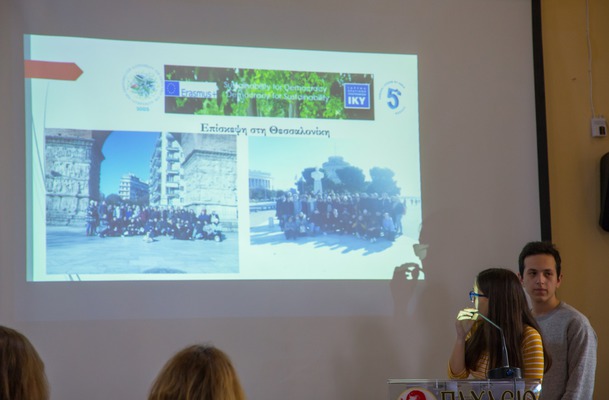
On Monday 20th May 2019, the last day of classes for the 2018-2019 school year the four Erasmus + ΚΑ2 programs implemented by the school as well as environmental education, health education and cultural projects were presented to the entire school community in the library of the 5th General Lyceum of Veria . Members of the teaching team and the student group of Erasmus + KA2 PROJECT-SCHOOL EDUCATION No.2018-1-PT01-KA229-047365 entitled "Sustainability for Democracy, Democracy for Sustainability", presented the actions taken during the school year in the context of the specific program. In-depth reference was initially made to the work done in order to prepare the two mobilities that took place firstly in Veria in January 2019 and secondly in Vaasa, Finland in the first week of May 2019. In particular, it was mentioned that in the first stage while working on the sub-topic "Democracy and the Environment in the Institutions" the students explored the role of the Institutions in the establishment of Democracy and the protection of the Environment on a local, national and European level. The students also designed the logo of the program, conducted a questionnaire survey on the role of the School as an institution in the development of Sustainability and contacted other educational institutions, the Municipal Authorities and Environmental Groups. In view of the second mobility of the Erasmus + KA2 program and for the needs of the sub-topic "Democracy, Environment and Economy", the students involved in the program studied the relation of Economics with the Environment and Democracy, after being informed by environmental experts and professionals about the financial and environmental issues concerning the Prefecture of Imathia. The students spoke enthusiastically about the experiences they have gained from their participation in the program so far, especially about the hospitality they offered during the first mobility and the one they received during the second mobility in Finland. They answered their classmates' questions and encouraged them to participate in future European programs.
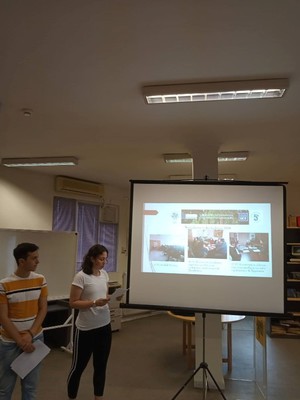
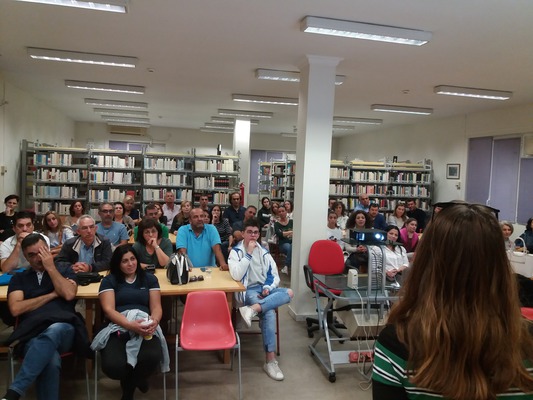
On Monday June 26th, at the end of the school year, the ERASMUS +KA2 program "Sustainability and Democracy, Democracy and Sustainability" participants of the 5th General Lyceum of Veria presented the activities of the program implemented during the current school year at the School Library. The students informed the public about the program's annual actions in a clear and compelling way. They first referred to the long-term preparation of the Greek team for the hosting of their foreign partners, and the research they conducted on Sustainability and the role of the Institutions in it. They focused on the hosting of twenty-one students and six teachers from the three partner schools of Finland, Portugal, and Estonia for one week in January 2019 (13/1/2019 to 18/1/2019), and explained how they worked in groups on the topics of the program and participated in a variety of activities covering all areas of Sustainability: environment, society, economy. The students emphasized that during those days they also had the opportunity to introduce the Greek culture to their European fellow students through visits to landmarks of Veria and Thessaloniki, stressing the element of multiculturalism that runs through Greek history. The two students who made the presentation also referred to the preparations for the trip of the Greek group to Vaasa, Finland. During the second mobility the European student partners participated in joint actions at the Finnish school and experienced the implementation of Sustainability in Finland. During the discussion that followed students, parents and teachers said they were excited about the experiences they had gained and highlighted the enormous benefits of the program implementation. The feedback received from the students and especially their parents has reinforced our desire to continue the program cooperation next year. The next mobility has been scheduled for November 2019 in Mafra, Portugal, with the participation of seven students and two teachers of our School.
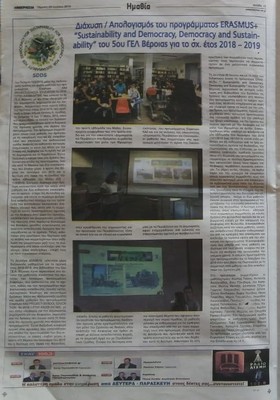
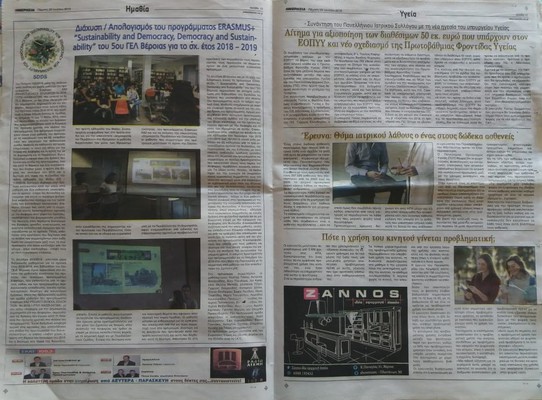
The participant students are: Kostas Tsilis, Antonis Vassiliadis, Vicky Tzouvara, Lia Kapalika, Melina Metaxas, Despina Tzima, George Lockmanidis, Katerina Della, Elena Theoudou, Sofia Panidou, Katerina Patopoulou, Vicky Mwisidou, Katerina Feizatidou, Anna Tzirou, Emilia Kirtsiou, Yiannis Psarras and Olympia Papaefthimiou. The pedagogical group of the program consists of the following teachers: Chara Axouristou, Efi Liakopoulou, Elena Giannaki, Katerina Totska, Stamatis Chrysis and Tassos Moschopoulos.
The program is cofounded by the European Union in cooperation with IKY, the national agency for Greece.
Τόπος:
2640 Mafra, Portugal
Saturday, 20 July 2019
The booklets
ERASMUS+ KA2 PROJECT – SCHOOL EDUCATION No. 2018-1-PT01-KA229-047365
“SUSTAINABILITY FOR DEMOCRACY,
DEMOCRACY FOR SUSTAINABILITY”
"Democracy, Environment and Economy"
Mobility2_Finland
booklet
click on the pdf file "Erasmus vt 2019 boklet.pdf" to read or to download the booklet
"Democracy, Environment and Economy"
Mobility1_Greece
booklet
click on the pdf file "Erasmus enskilda sidor.pdf" to read or to download the booklet
DEMOCRACY FOR SUSTAINABILITY”
Mobility2_Finland
booklet
click on the pdf file "Erasmus vt 2019 boklet.pdf" to read or to download the booklet
"Democracy, Environment and Economy"
Mobility1_Greece
booklet
click on the pdf file "Erasmus enskilda sidor.pdf" to read or to download the booklet
Ετικέτες
Borgaregatans Skola - Vaasa Fiinland
Τόπος:
Vaasa (Vasa), Finland
Report on the mobility in Finland
ERASMUS+ KA2 PROJECT – SCHOOL EDUCATION No. 2018-1-PT01-KA229-047365
“SUSTAINABILITY FOR DEMOCRACY,
DEMOCRACY FOR SUSTAINABILITY”
"Democracy, Environment and Economy"
DEMOCRACY FOR SUSTAINABILITY”
Mobility2 _Finland
Report on the mobility in Finland
CONTENT, METHODOLOGY AND RESULTS
In this
Mobility we focused a lot on how Economy effects the Environment and how we can
get a Sustainable development according to these things. We visited the local
Power plant and Waste disposal plant to learn about how waste can be good for
Economy and the Environment can be kept clean. We also had the possibility to
learn how to build our own Water Power Plants in practical workshops at school.
Sustainable economy must think about the environment.
Local companies
held presentations about themselves as future workplaces for youths of today.
This may have opened the eyes of some students when it comes to future
jobs.
· twenty-one students from the host
country Finland (Anastasia Tarasenko, Alina Östergård,
Hanna Mwangi, Isabelle Lithén, Lisa Nyqvist, Tea Haajamo, Kristina Saarela,
Emilia Håkans, Ida Smeds, Matilda Eriksson, Miina Jousmäki, Rebecka Asplund,
Alva Sandelin, Aron Paloheimo, Hannes Hiekkanen, Nellie Höglund Karolina Ågren, Inka Österblad, Emil Zittra,
Daniel Berg, Axel Ålgars) and six teachers (Monica
Mattbäck, Mikaela Hansen, Jeanette Kecklund, Ulla-Maija Holmfors-Andtbacka, Ulrika Nabb and
Mats Nyblom)
· seven students from Portugal
(Catarina Ribeiro, Inês Ferreira,
Márcia Mouta, Margarida Santos, Marta Afonso, Marta Pinto, Marta Cabeça) and two
accompanying teachers (Alexandra Bento and Jorge Rocha).
· seven students from Estonia (Caroly
Kiik Juuli-Johanna Aaman Joanna Roopa Carmen Pajuste Jaak Priilinn Andreas Idavain
Miikael Martti Vatunen) and two accompanying teachers (Kertu Priilin and
Piret Kukk).
· seven students from Greece (Maria Tsouflidou, Katerina Della, Elena Theodorou, Sofia Panidou, Vicky Moisidou, Leonidas Koukouravas, Nikos Tsiflidis) and two
accompanying teachers (Anastasios Moschopoulos and Charikleia
Axouristou).
HOW THE ACTIVITY IS LINKED TO NORMAL SCHOOL ACTIVITIES
Mobility2 _Finland
Report on the mobility in Finland
CONTENT, METHODOLOGY AND RESULTS
The second
Transnational Learning Activity focused on “Democracy, Environment and
Economy”.
In this
Mobility we focused a lot on how Economy effects the Environment and how we can
get a Sustainable development according to these things. We visited the local
Power plant and Waste disposal plant to learn about how waste can be good for
Economy and the Environment can be kept clean. We also had the possibility to
learn how to build our own Water Power Plants in practical workshops at school.
Sustainable economy must think about the environment.
Local companies
held presentations about themselves as future workplaces for youths of today.
This may have opened the eyes of some students when it comes to future
jobs.
Our guests had
also the possibility to visit Technobotnia, which is a
centre of modern high-tech know how. There will be possible to find new
technical solutions on all kinds of problems that we have today and these can
help us to work for a sustainable development in all areas.
The seven
transnational groups did a fantastic job on their presentations and came up
with a good summery of the week. The presentations were dived into different
subjects for example one group compared the pros and cons of economic activity
on environment and another group compared national candidates and their
environmental thinking in the upcoming EU-election.
PARTICIPANTS
· twenty-one students from the host
country Finland (Anastasia Tarasenko, Alina Östergård,
Hanna Mwangi, Isabelle Lithén, Lisa Nyqvist, Tea Haajamo, Kristina Saarela,
Emilia Håkans, Ida Smeds, Matilda Eriksson, Miina Jousmäki, Rebecka Asplund,
Alva Sandelin, Aron Paloheimo, Hannes Hiekkanen, Nellie Höglund Karolina Ågren, Inka Österblad, Emil Zittra,
Daniel Berg, Axel Ålgars) and six teachers (Monica
Mattbäck, Mikaela Hansen, Jeanette Kecklund, Ulla-Maija Holmfors-Andtbacka, Ulrika Nabb and
Mats Nyblom)
· seven students from Portugal
(Catarina Ribeiro, Inês Ferreira,
Márcia Mouta, Margarida Santos, Marta Afonso, Marta Pinto, Marta Cabeça) and two
accompanying teachers (Alexandra Bento and Jorge Rocha).
· seven students from Estonia (Caroly
Kiik Juuli-Johanna Aaman Joanna Roopa Carmen Pajuste Jaak Priilinn Andreas Idavain
Miikael Martti Vatunen) and two accompanying teachers (Kertu Priilin and
Piret Kukk).
· seven students from Greece (Maria Tsouflidou, Katerina Della, Elena Theodorou, Sofia Panidou, Vicky Moisidou, Leonidas Koukouravas, Nikos Tsiflidis) and two
accompanying teachers (Anastasios Moschopoulos and Charikleia
Axouristou).
HOW THE ACTIVITY IS LINKED TO NORMAL SCHOOL ACTIVITIES
This Erasmus+
KA2 project “Sustainability for Democracy, Democracy for Sustainability” and
especially the second Transnational Learning Activity focused on “Democracy,
Environment and Economy” is something that fits in very well to our curriculum.
Since Vasa is well known for the energy cluster we work a lot
with energy questions in our school. The workshops and the presentations from
the local companies as well as the visit to Stormossen and Westenergy are included
in the Energy theme week for the ninth grade.
Ετικέτες
Borgaregatans Skola - Vaasa Fiinland
Τόπος:
Vaasa (Vasa), Finland
Subscribe to:
Posts (Atom)


































